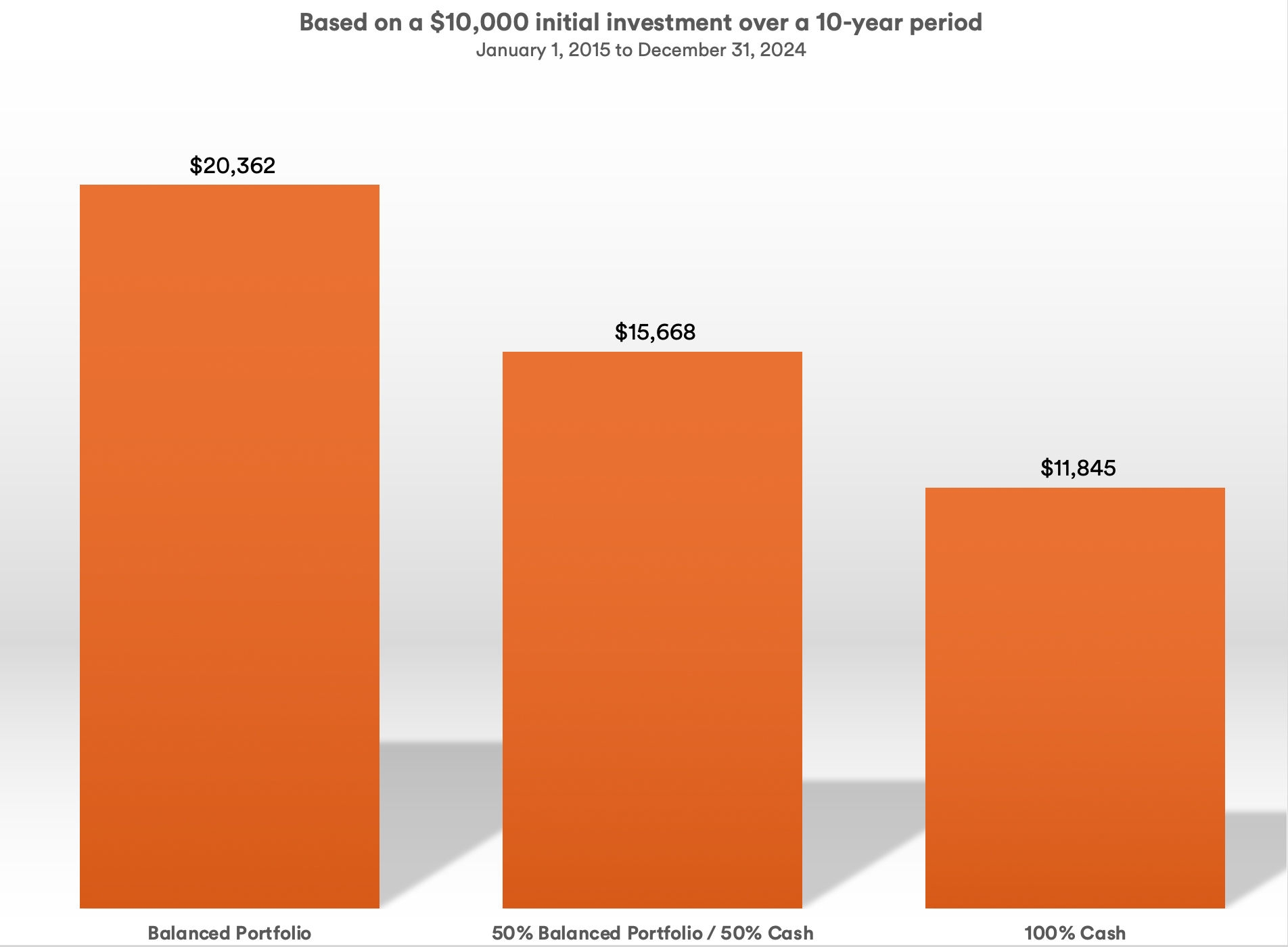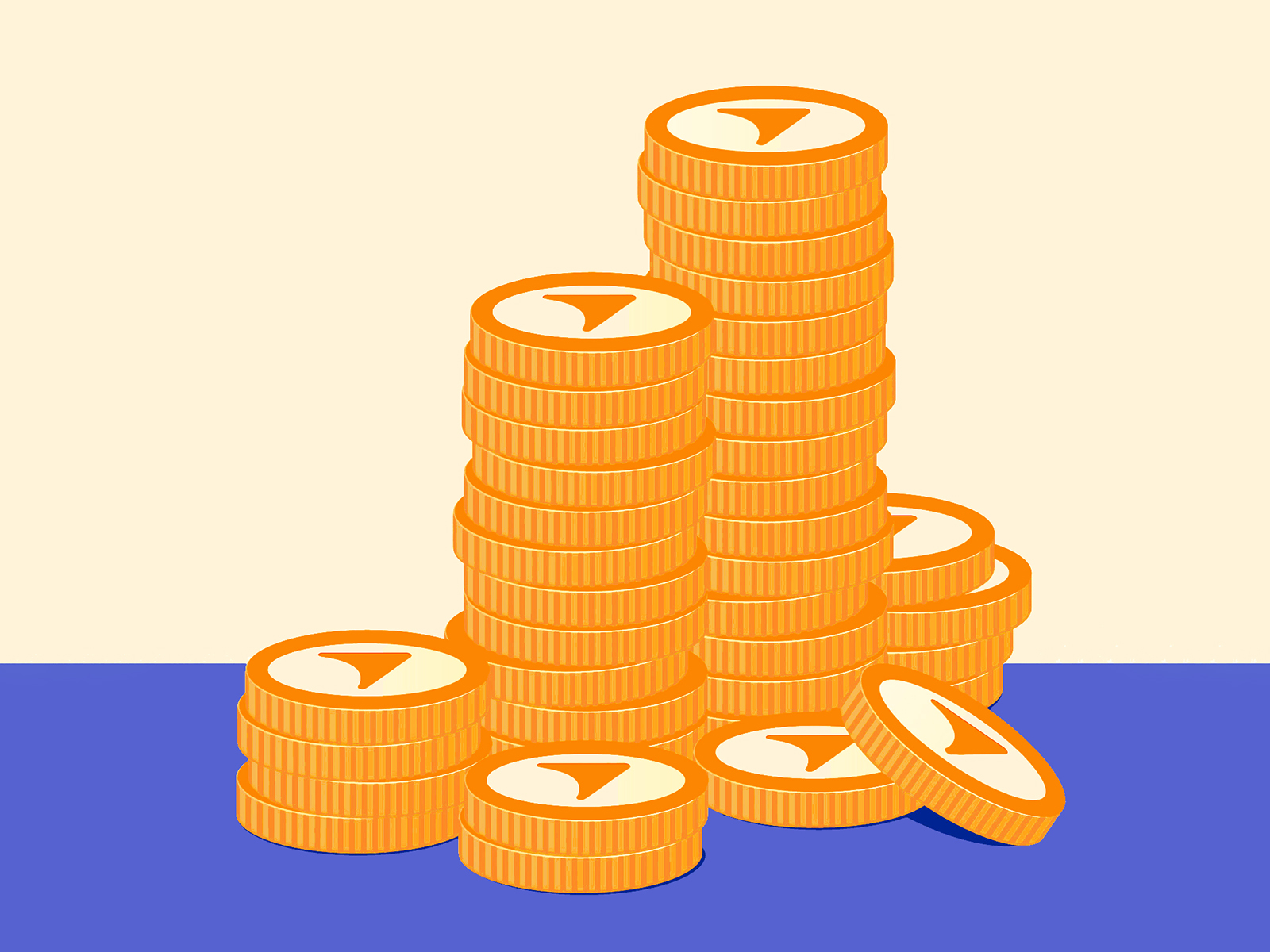What should you do with your cash?
Cash feels easy. It’s familiar, it’s right there in your wallet (or app), and it gives you that comforting sense of control.
For everyday spending or a rainy-day fund, we need a certain amount of money on hand — usually in a chequing or savings account that we can access at any time.
But when it comes to long-term investing, holding too much cash can quietly chip away at your financial goals.
So let’s take a closer look at why “cash is king” might not always be the best advice — and what it could be costing you in the long run.
What do we mean by cash?
This question might seem basic, but it helps to get your definitions straight, especially when one word can have so many meanings. In this article, when we mention cash, we’re talking about two things:
- hard currency, like the kind you put in your wallet, hide under your mattress or keep in a chequing or savings account;
- cash equivalents, which are short-term, highly liquid investments like a money market fund.
Now that that’s out of the way, let’s get into it.
How cash can put a drag on your investments
When it comes to your long-term portfolio, a little cash can go a long way—but too much may hold you back. As markets grow, cash tends to lag behind investments like stocks, bonds or a balanced mutual fund portfolio. It’s kind of like trying to run a marathon with a heavy backpack: the more cash you carry, the harder it is for your portfolio to pick up speed. Over time, that drag can really add up, making it harder to reach your financial goals. So, while cash has its role, keeping it in check is key to staying on track.

Source: Morningstar. The example is for illustrative purposes only. Investment values calculated using a starting value of $10,000 and annual compounded returns from January 1, 2015 – December 31, 2024. Balanced portfolio invests in a blend of 40% FTSE Canada Universe Bond, 30% S&P/TSX Composite Index, and 30% MSCI World GR Index. Cash is represented by the FTSE Canada 91 Day T-Bill Index. It is not possible to invest directly in an index. Assumes reinvestment of all income and no transaction costs or taxes.
Manage risk, don’t avoid it
The value of stocks can fluctuate considerably during times of market volatility. This is referred to as market risk. While cash can provide stability against such volatility in your portfolio, its value also often doesn’t go up much over time. That’s why too much cash can expose you to another form of risk: inflation risk.
If you’ve noticed your grocery bill creeping up or your morning coffee costing more than it used to, you’ve already felt the effects of inflation. Over time, inflation quietly eats away at the value of your money. So if your cash isn’t growing fast enough to keep up with rising prices, you’re actually losing purchasing power.
Your money might look the same on paper, but it buys you less in the real world.
Yes, markets can be bumpy, and seeing your investments dip can feel unsettling in the moment. But over the long haul, those ups and downs often smooth out. Think of it like a road trip: a few potholes along the way doesn’t stop you from reaching your destination.
What's the right amount of cash?
What would Goldilocks choose? Not too much, not too little, but just the right amount.
Instead of parking your long-term investments in cash in an attempt to manage risk, consider a more strategic approach.
Every investor needs to consider for themselves their long-term investing goals and the degree of risk they’re willing to accept. While an aggressive investment strategy can be too much for many to stomach, an overly conservative approach of keeping your savings in cash may hinder growth potential and increase the risk of falling short of goals, especially after factoring in inflation.
Tangerine Investments offer a range of Portfolios with different amounts of potential risk and return, that are regularly rebalanced to maintain the level of risk you’re comfortable with.
When you open an Account, either online or with one of our Advisors, we will walk you through a series of questions to assess your goals, time horizon and risk appetite, in order to select the Portfolio best suited for your unique needs.
Get a 2% Investment Bonus♢♢
Move money to Tangerine Investments & earn up to $20,000 per Account type.
Is your cash working for you?
Here are some questions you can ask to determine if your cash is working for you:
- Do you have sufficient cash set aside for an emergency fund? Keep this amount separate from your long-term investments.
- Do you have cash set aside that you intended to invest? If so, act today to put that cash to work in your Investment Portfolio.
- Does the cash component of your Portfolio match your investor profile and risk tolerance? Are you willing to accept lower returns for perceived safety? Review your investor profile with your Tangerine Advisor to determine if there’s an investment strategy that can serve you better.
The bottom line
When you're investing for the long haul, allowing too much of your money to sit in cash is a bit like leaving your car in park—you’re not going to get very far.
Want to speak to a Tangerine Advisor? Call us from Monday to Friday, 8 am to 8 pm ET, at 1-877-464-5678.










